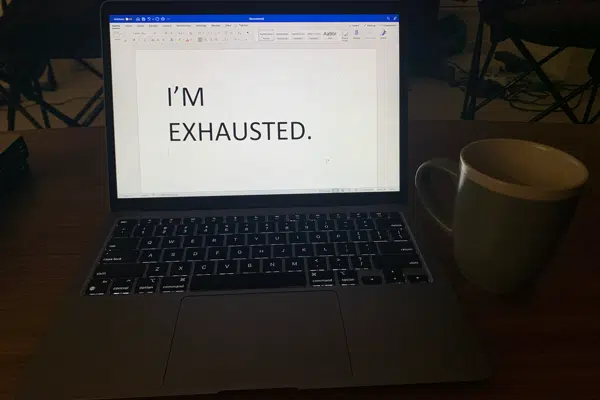
A laptop screen displaying text (Emma Duke, CMRU.CA)
Burnout is defined as a state of stress that results in an individual no longer being able to perform to the best of their ability. It is often characterized by emotional and physical exhaustion and disengagement.
Burnout Amongst University Students
Burnout is common and, to a degree, normalized among university students. A survey conducted at Ohio State University found that 71% of their students experienced burnout in 2021, 31% higher than the year before. COVID-19 is likely responsible for this increase.
I have heard the sentence “I’m fine, I’m just burnt out” more times than I can count throughout my own university career. I have watched my friends, peers and myself struggle through burnout.
My Experience with Burnout
I believe a factor that contributed to increased burnout during the COVID-19 pandemic is that people found it harder to set boundaries with their work because they were working from home. I have struggled to set boundaries in my own academic journey and this has resulted in my being burned out.
I was homeschooled until high school, so I never was under the impression that once I ‘came home’ it was time to rest; I was always home and found it difficult to set boundaries, to force myself to stop working. There was always more school work I could do, I was setting my own pace for the courses I completed and I wanted to succeed.
My efforts to place school above my hobbies and self-care were not reward, however. I am thankful that my mother was my teacher and did not let me prioritize school over myself.
My unhealthy work habits did carry into university, though. Here, I am rewarded for overworking myself, with high grades and good feedback.
At the beginning of this semester, I burnt myself out by doing more than was expected of me and staying at school until late hours. I ignored what my body was telling me, that I needed rest, and made myself physically exhausted and sick.
Recognizing Burnout
I had an inkling I was burnt out when it took much longer for me than usual to complete simple school tasks or assignments. I was also experiencing high stress levels and frustration both in school and in other areas of my life.
Some more common symptoms of burnout include the following:
- Extreme stress
- Isolating yourself from others
- Procrastinating
- Insomnia
- Emotional numbness
Overcoming Burnout
I implemented some things into my routine to help myself overcome and avoid future cases of burnout:
- Planned my school schedule weeks ahead of time.
- Setting manageable goals for each day.
- Not doing more than I have planned. This helps me avoid stress and make time throughout the week to see friends or do things I love.
Other tips to overcome burnout:
- Seek support
- Participate in physical activity
- Create a sleep schedule
- Set boundaries
If you’re experiencing burnout, don’t ignore the symptoms. Come back from reading week the healthiest you can!



Comments